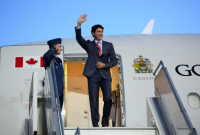Support strong Canadian climate journalism for 2025
The Canadian military will command a new NATO training and capacity building mission in Iraq for its first year, Prime Minister Justin Trudeau said in Brussels on Wednesday as part of the alliance's annual summit.
He said the mission, to begin in the fall of 2018 in Baghdad and the surrounding vicinity, will include the deployment of as many as 250 Canadian Armed Forces personnel and up to four Griffon helicopters to support NATO activities.
"This is something that we believe in deeply," Trudeau said of the new Iraq mission.
"This is a moment for us to stand together and understand that the perspective that we fight for and stand for is essential today and tomorrow."
The Iraqi mission, combined with Tuesday's announcement that Canada's commitment to the NATO mission in Latvia is being extended by another four years until 2023, could help Trudeau counter criticism from U.S. President Donald Trump that alliance members spend more to meet spending targets.
"Supporting the new fledgling democracy in Iraq, which has been so battered, is so fragile, is a great thing for Canada to be doing ... it is dead centre in what Canada is good at," said Foreign Affairs Minister Chrystia Freeland.
"We are a country that really believes that winning the war is just the first step and we have to work really hard to win the peace."
As for Trump's demand, Freeland said Canada was a NATO co-founder and has contributed to every single alliance mission.
"Our presence there (Latvia) is a very meaningful, strong important contribution and this new contribution ... it's another sign of Canada stepping up."
Canada's leadership of this new NATO training mission will complement existing efforts in the global coalition against ISIL.
Under Operation IMPACT, the Canadian army is already providing training and assistance to the Iraqi security forces and helping regional forces build their capacity.
Canada also contributes mobile training teams to NATO's counter-improvised explosive device capacity building efforts for Iraq. This initiative builds on that effort.
Defence Minister Harjit Sajjan said the Iraq mission is about giving Iraqi security forces the right training so they can "deal with and prevent" the rise of groups like ISIL.





Comments
Dear National Observer, I really appreciate your investigative journalism - particularly with regard to environmental reporting. However, I have found that much of your foreign policy reporting reads very much like standard mainstream news media coverage (i.e., repackaging government press releases without critical analysis or commentary). I am a subscriber to your service and provide the extra donation as well to support your good work. I would very much appreciate if you were to bring to your foreign policy coverage the same level of care as you do to your environmental coverage.
For example, in this story, Minister Freeland states that "Supporting the new fledgling democracy in Iraq, which has been so battered, is so fragile, is a great thing for Canada to be doing", and this may indeed be a great thing for Canada to be doing, but is the current approach of Canada contributing troops, equipment, and money to NATO operations in Iraq the best way to be doing this? Surely there are experts in foreign policy and peace organizations that could be consulted to inquire about this (and I don't just mean the arms industry funded think tanks). Perhaps a more effective foreign policy for Canada (and Iraq, and other regions of the world) would be to focus on Canada funding and contributing to UN peace keeping operations as opposed to a military alliance that operates as an arm of America's global empire. For instance, Freeland's next quote is that "We are a country that really believes that winning the war is just the first step and we have to work really hard to win the peace.". Surely a follow up question or comment about how this 'war' that was won, ranks as one of the greatest crimes of the 21st century and one that Canada heroically resisted participating in. Though you would not know that by Minister Freeland's comments.
Please consider raising the bar on your foreign policy coverage, it is ever more desperately needed now. As tensions around the world are heating up and there is an unpredictable bull (Trump) running around the world's china shop.